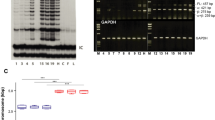Abstract
Cutaneous squamous cell carcinoma (SCC) keratinocytes readily grow, expand in culture, and continuously passage, suggesting either spontaneous immortalisation at the early stage of culture or inherent proliferative capacity. One feature of SCC keratinocytes is genomic DNA rearrangement and single-nucleotide polymorphism studies of fresh frozen primary tumour, early and late passage SCC keratinocytes suggest that these rearrangements are stable in culture and retain the parental tumour lesions. SCC keratinocytes are isolated using standard primary culture techniques and become feeder cell independent with little or no observed “crisis” period. SCC keratinocytes readily form tumours in vivo, which retain histological features of the parental tumour, making them an excellent model for the study and development of cancer therapies.
Access this chapter
Tax calculation will be finalised at checkout
Purchases are for personal use only
Similar content being viewed by others
References
Rheinwald, J. G., and Green, H. (1975) Serial cultivation of strains of human epidermal keratinocytes: the formation of keratinizing colonies from single cells. Cell 6, 331–43.
Rheinwald, J. G., and Beckett, M. A. (1981) Tumorigenic keratinocyte lines requiring anchorage and fibroblast support cultures from human squamous cell carcinomas. Cancer Res 41, 1657–63.
Navsaria, H., Sexton, C., Bouvard, V. & Leigh I.M. (1994) Growth of keratinocytes with a 3T3 feeder layer: basic techniques, in Keratinocyte Methods (LEigh, I. M. W., F.M., Ed.) pp 5–12, Cambridge University Press, Cambridge.
Hayflick, L., and Moorhead, P. S. (1961) The serial cultivation of human diploid cell strains. Exp Cell Res 25, 585–621.
Purdie, K. J., Lambert, S. R., Teh, M. T., Chaplin, T., Molloy, G., Raghavan, M., Kelsell, D. P., Leigh, I. M., Harwood, C. A., Proby, C. M., and Young, B. D. (2007) Allelic imbalances and microdeletions affecting the PTPRD gene in cutaneous squamous cell carcinomas detected using single nucleotide polymorphism microarray analysis. Genes Chromosomes Cancer 46, 661–9.
Song, C., Appleyard, V., Murray, K., Frank, T., Sibbett, W., Cuschieri, A., and Thompson, A. (2007) Thermographic assessment of tumor growth in mouse xenografts. Int J Cancer 121, 1055–8.
Acknowledgments
KJP is funded by Cancer Research UK; CP and APS are funded by the Dystrophic Epidermolysis Bullosa Research Association.
Author information
Authors and Affiliations
Corresponding author
Editor information
Editors and Affiliations
Rights and permissions
Copyright information
© 2011 Springer Science+Business Media, LLC
About this protocol
Cite this protocol
Purdie, K.J., Pourreyron, C., South, A.P. (2011). Isolation and Culture of Squamous Cell Carcinoma Lines. In: Cree, I. (eds) Cancer Cell Culture. Methods in Molecular Biology, vol 731. Humana Press. https://doi.org/10.1007/978-1-61779-080-5_14
Download citation
DOI: https://doi.org/10.1007/978-1-61779-080-5_14
Published:
Publisher Name: Humana Press
Print ISBN: 978-1-61779-079-9
Online ISBN: 978-1-61779-080-5
eBook Packages: Springer Protocols




